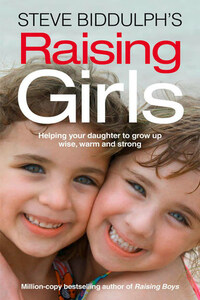Thorsons
An imprint of HarperCollinsPublishers
1 London Bridge Street
London SE1 9GF
www.harpercollins.co.uk
First published in 1997 by Finch Publishing Pty Ltd, Australia
Revised and updated edition published in 2010 by HarperThorsons
This revised and updated edition 2018
Text © Stephen and Shaaron Biddulph 1998, 2003, 2008, 2018
Cover layout design © HarperCollinsPublishers Ltd 2018
Cover photograph © KidStock/Blend Images/Getty Images
Illustrations by Paul Stanish
Permissions: The author gratefully acknowledges the permission of the following for the right to reproduce copyright material in this publication: ‘What Fathers Do’ by Jack Kammer, is reprinted from Full-Time Dads, May/June 1995 Issue, with the permission of the author; six myths of porn is reprinted from Elizabeth Clark, Love, Sex and No Regrets for Today’s Teens (Finch, Sydney, 2017).
A catalogue record of this book is available from the British Library
Steve Biddulph asserts the moral right to be identified as the author of this work
All rights reserved under International and Pan-American Copyright Conventions. By payment of the required fees, you have been granted the nonexclusive, non-transferable right to access and read the text of this e-book on screen. No part of this text may be reproduced, transmitted, downloaded, decompiled, reverse engineered, or stored in or introduced into any information storage retrieval system, in any form or by any means, whether electronic or mechanical, now known or hereinafter invented, without the express written permission of HarperCollins e-books.
Find out about HarperCollins and the environment at
www.harpercollins.co.uk/green
Source ISBN: 9780008283674
Ebook Edition © April 2018 ISBN: 9780007519736
Version: 2018-03-28
In memory of Joan Biddulph
1928–2017
for words, laughter, and big skies
Boyhood is transforming; that’s it in a nutshell. If you’ve been in any school gate or online conversations in the past twenty years, you’ll know that things are on the move. We’re learning how to make boyhood a happier place, and that knowledge is saving lives.
The book you hold in your hand had a very interesting effect that echoed around the world – it was as if a million mothers and fathers all at once gave an enormous sigh of relief. (Our boy is normal!) For one thing, the book cut through the endless argument between nature and nurture by saying, ‘It’s both.’ But nurture is the one we can do something about, so let’s get started.
In a world where so many boys struggled, there was a desperate need for a new approach. Raising Boys provided that. It said that if we want boys to grow into truly good men with warm hearts and strong backbones, then we have to understand their specific needs. Just as with girls, specific risk factors go with being an average boy. These range from the everyday to the truly terrible – from not liking school at four, to having three times the risk of dying in their teens (mostly from car accidents, suicide or violence) and nine times the chance of going to jail.1 These are not small things. But if we understand what makes our boys unique, we can love them better and make sure they turn out well.
Today we understand that gender is on a continuum. Knowing a child is a boy or a girl doesn’t tell you anything, necessarily, about what they will be like. But although gender is a line, there are big bumps on that line, and so we can say ‘most’ boys and ‘most’ girls without meaning it has to apply to all. Most boys are slower at learning to talk, and being ready to read or write, than most girls. Most start puberty a year or two later than girls. (Girls’ puberty is over by fourteen, and they have shot up to their full height. Boys’ puberty doesn’t end until they are about seventeen, and their brains don’t fully mature until their twenties.) These things matter if you have a boy to raise, and keep alive.
The differences are not just on the outside. The evidence grows and grows that boys’ chemistry is very different from early in the womb, predisposing most of them to greater muscle mass, more need for movement and activity, an excitement about competition, and a love of concrete ways of learning. Though there are definitely some girls who are like this, and boys who are not. Keep remembering that mantra – most, not all.
Boys’ brains develop more slowly, and their nervous system wires up in a different sequence, and that is a massive thing because it means that in the UK and Australia, they start school far too young, and often hate it because it’s too formal, too much based on sitting still. Good schools for boys are the ones that give them room to move and time to grow.











